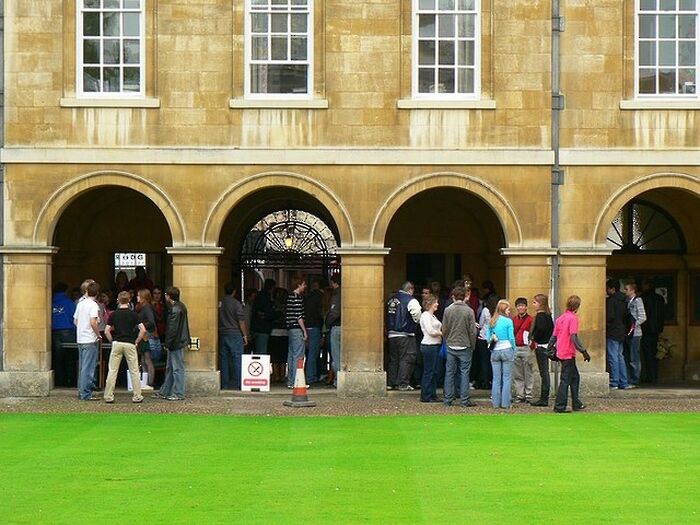Fees frozen amid concerns over ‘unsustainable’ system
Theresa May blocks the latest planned rise in tuition fees, and raises the graduate repayment threshold

In an attempt to increase her party’s credibility among young voters and alleviate student debt, Prime Minister Theresa May has announced a freeze in maximum annual tuition fees at £9,250, rejecting next year’s planned rise to £9,500.
She also announced a raise in the repayment threshold on student loans from £21,000 to £25,000, and a “major review” into English university funding.
Once graduates begin earning over £25,000 per year, they will be required to put 9% of their income towards fee repayments each year. Every graduate who earns over £21,000 per year will now pay less in annual repayments, saving them approximately £800 up front, and, as estimated by the Institute for Fiscal Studies (IFS), costing the government £2.3bn per year.
While the IFS have warned that the freeze on fees is “unsustainable”, they have noted that the change means a typical graduate will pay back £15,700 less over 30 years, before any unpaid loans are written off. A corollary of this is that 83% of graduates will not pay back all their debts, raising the long-term costs for the Government significantly.
Theresa May’s former adviser, Nick Timothy, has called the student loans system a “Ponzi scheme” and has expressed concerns about too many students going to university and not benefiting from it. In her speech on Wednesday, May seemed in tune with this view:
“[T]oday, young people take on a huge amount of debt to [go to university]. And if we’re honest, some don’t know what they get from it in return.”
Meanwhile, Higher Education Minister Jo Johnson, speaking at a fringe event at the Conservative conference this week, has suggested that some students can choose to “have a frugal existence” in order to cover the costs of university.
The Government has been criticised for not doing enough to tackle the £100bn debt now burdening six million British graduates. Current students will be graduating with an average of £50,000 of debt, according to the IFS.
Amatey Doku, NUS Vice-President for Higher Education and former President of CUSU, commented on the Prime Minister’s speech: “I had low expectations, but it turns out that they weren't low enough. The Telegraph called it a "revolution" which is true, if you mean that we're going round and round in circles.”
Doku has also criticised the Government for failing to address interest rates and maintenance support. He is set to appear in a debate at the Cambridge Union on Thursday next week, when he will be arguing for tuition fees to be scrapped entirely.
The average annual cost per undergraduate at the University of Cambridge is now £18,500. This cost has risen by nearly £4,000 in the past seven years. Last year, Varsity also reported a £7,700 “funding gap” between the amount of money Cambridge receives per year for undergraduates, and the amount it pays to teach them.
Tuition fees cover around half the cost, and the Government’s teaching grants cover around one fifth. This leaves a funding shortfall which universities largely cover with income from postgraduate and overseas student fees.
Frequent changes to university funding have created planning problems for some universities, which require long-term strategies to adapt to higher student costs and unreliable sources of income.
Unsurprisingly, there has also been concern about higher fees discouraging students from poorer backgrounds from applying to university. In 2015, Vice-Chancellor Leszek Borysiewicz told the Times Higher Education that he would be “concerned about increases in fees,” worrying that they might damage access efforts.
Welcoming the announced changes, Alistair Jarvis, Chief Executive of Universities UK, said that “we're pleased the Government is looking at ways of addressing students' money concerns. Raising the loan repayment threshold will put extra cash in the pockets of many graduates starting their careers. Universities UK would like to see the Government going further by reintroducing maintenance grants for those most in need and reducing interest rates for low and medium earners. We also need to do more to reverse the worrying decline in the numbers of part-time and mature students.”
The University of Cambridge declined a request to comment on the changes at this time
 News / Report suggests Cambridge the hardest place to get a first in the country23 January 2026
News / Report suggests Cambridge the hardest place to get a first in the country23 January 2026 News / Reform candidate retracts claim of being Cambridge alum 26 January 2026
News / Reform candidate retracts claim of being Cambridge alum 26 January 2026 News / Cambridge ranks in the top ten for every subject area in 202623 January 2026
News / Cambridge ranks in the top ten for every subject area in 202623 January 2026 Comment / Cambridge has already become complacent on class23 January 2026
Comment / Cambridge has already become complacent on class23 January 2026 News / Palestine activists project slogans onto John’s24 January 2026
News / Palestine activists project slogans onto John’s24 January 2026










